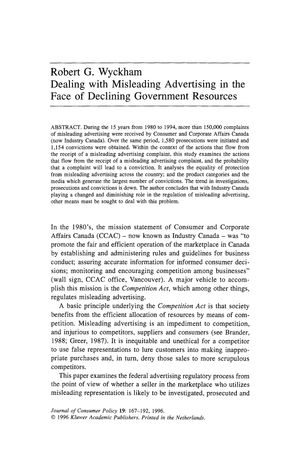Dealing With Misleading Advertising in the Face of Declining Government Resources
June 1996
in “
Journal of Consumer Policy
”

TLDR The document concludes that with limited resources, the government should focus on impactful enforcement against misleading advertising and encourage businesses to follow guidelines to prevent deception.
The 1996 document by Robert G. Wyckham outlines the challenges faced by Industry Canada in regulating misleading advertising with limited resources. From 1980 to 1994, over 150,000 complaints were received, but only 1,580 prosecutions and 1,154 convictions occurred, indicating a less than 1% chance of a complaint leading to a conviction. The trend of investigations, prosecutions, and convictions was declining, and the document suggests that alternative resolutions such as Undertakings and Consent Prohibition Orders were becoming more common. The majority of misleading advertising convictions involved local or regional companies, with home entertainment equipment being the most convicted product category, and print media advertisements leading to the most convictions. The document also notes significant regional variations in the cost of obtaining convictions and suggests that with limited resources, efforts should be directed where they can have the most impact. It emphasizes the importance of industry and business adopting guidelines to prevent deceptive advertising and suggests a need for more regional councils to manage the issue locally, highlighting a collective responsibility between business and government to minimize the impact of false advertising.